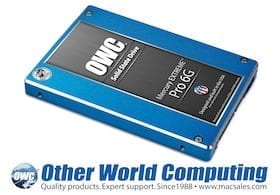 Other World Computing today announced its new OWC Mercury Extreme Pro 6G SSD, the next generation of OWC’s SandForce® Driven™ SATA Revision 3.0 6Gb/s Solid State Drives. By utilizing the highest quality components and design available, the OWC Mercury Extreme Pro 6G SSD delivers new heights of drive performance with sustained data rates of up to over 550MB/s – up to 267% faster performance than other leading brands’ 6G SSDs.
Other World Computing today announced its new OWC Mercury Extreme Pro 6G SSD, the next generation of OWC’s SandForce® Driven™ SATA Revision 3.0 6Gb/s Solid State Drives. By utilizing the highest quality components and design available, the OWC Mercury Extreme Pro 6G SSD delivers new heights of drive performance with sustained data rates of up to over 550MB/s – up to 267% faster performance than other leading brands’ 6G SSDs.
Three Capacities Offered Starting At $319.99
The OWC Mercury Extreme Pro 6G, designed and built in the USA, is currently available in a 120GB capacity with limited availability for same day order shipping. Volume availability and fulfillment of all 120GB, 240GB, and 480GB model orders is expected within the next 30 days. Consumers can order with confidence…if the MSRP is lowered before an order ships, OWC will automatically adjust the invoice to the new lower price. Conversely, because the supply of performance flash components is currently impacted due to both growing demand as well as the tragedy in Japan, the drives’ MSRP may be raised, based on cost changes – although existing backorders will be price protected at the level placed. Over the longer term, OWC expects a more normal downward trend in Flash component cost.
- 120GB OWC Mercury Extreme Pro 6G with 7% Over Provisioning and Synchronous Tier 1/Grade A NAND $319.99 initial MSRP Limited availability for immediate same day order shipping
- 240GB OWC Mercury Extreme Pro 6G with 7% Over Provisioning and Synchronous Tier 1/Grade A NAND $579.99 initial MSRP Volume fulfillment by/before 5/20/11
- 480GB OWC Mercury Extreme Pro 6G with 7% Over Provisioning and Synchronous Tier 1/Grade A NAND $1799.99 initial MSRP Volume fulfillment by/before 5/31/11
Leading Benchmarking Sites Confirm Industry Leading Performance
To deliver maximum consumer confidence that the new Pro 6G SSD offers the pinnacle of SSD performance, OWC sent its 120GB capacity model to several leading Mac and PC performance benchmarking sites. The SSD Review awarded the OWC Pro 6G “Editor’s Choice without a second thought”; Barefeats called it “the fastest drive we’ve tested to date.”; MacPerformanceGuide said the Pro 6G offers “never before seen drives speeds….awesome!”; and TweakTown awarded it a ‘Must Have Editor’s Choice’ because it offers “performance higher than you can dream about.”
Maximizes Any Computer’s 3G And 6G Data Bus
Whether a consumer has a Mac or PC with the SATA 2.0 (3Gb/s) data bus or machine with the latest SATA 3.0 (6Gb/s) interface, the OWC Mercury Extreme Pro 6G SSD is able to deliver near bus saturating speed when installed in either interface. OWC benchmark testing confirms the Pro 6G SSD delivers up to 284MB/s sustained reads and 266MB/s writes in the SATA 2.0 300MB/s max speed bus. Taking advantage of the SATA 3.0 interface’s maximum bandwidth of 600MB/s, the Pro 6G SSD provides up to 559MB/s sustained reads and 515MB/s writes.
Highest Quality Components & Design Combine For Up To 267% Faster Performance
To achieve the higher bandwidth potential of the SATA 6Gb/s bus standard, OWC Mercury Extreme Pro 6G SSDs utilize synchronous NAND instead of commonly utilized asynchronous NAND. Synchronous NAND enables reads and writes to be “synced” with the SSD processor’s clock signal for up to 267% faster performance than other leading brands’ 6G SSDs.
Doesn’t Slow Down With Use Like Ordinary SSDs
Ordinary SSDs offer fast read/write performance during first initial uses, but can then experience significant write speed degradation over repeated, long term usage. Independent simulation tests by leading drive performance experts confirm the OWC Mercury Extreme Pro 6G SSD’s ultra-efficient Block Management & Wear Leveling technologies are able to eliminate virtually any reduction in data transfer speeds over heavy long term usage of the drive and without dependency on less than effective OS TRIM management.
Up To 100X Greater Data Protection
Utilizing SandForce DuraClass™ technology, the OWC Mercury Extreme Pro 6G is able to provide up to 100X higher data protection than provided by ordinary SSDs as well as leading enterprise class hard disk drives. By combining the highest level of Error Correction Code (ECC) and SandForce RAISE™ (Redundant Array of Independent Silicon Elements) technology along with 7% over provisioning, the OWC Mercury Extreme Pro 6G provides RAID like data protection and reliability.
“We’re absolutely thrilled with the expert proclaimed industry fastest performance of these newest Mercury Extreme Pro drives,” said Larry O’Connor, Founder and CEO, Other World Computing. “Those results are a testament to our philosophy of building products with the highest quality components and design architecture to obtain the highest level data transfer speed and reliability.”
Expands Most Comprehensive SSD Line For Macs And PCs
The new Mercury Extreme Pro 6G SSD joins OWC’s existing line of performance leading, record breaking SATA 2.0 interface Mercury Extreme Pro SSDs available in capacities from 40GB to 480GB starting from $99.97 that recorded industry firsts as well:
- OWC Mercury Aura™ Pro line with the first and only high performance SandForce processor based SSDs for 2008-2010 Apple MacBook® Air models; and netbook/subnotebook computers that use an internal 1.8″ sized SATA drive.
- OWC Mercury Legacy™ line with the first and only SandForce processor based IDE/ATA SSDs available for pre-Intel PowerPC based Mac and PC notebook/laptop and desktop/tower computers.
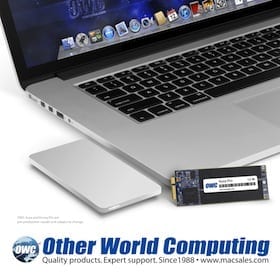
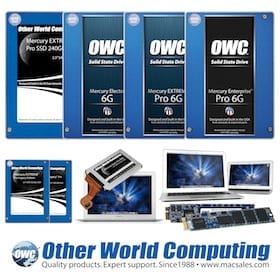
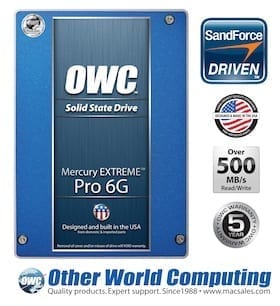
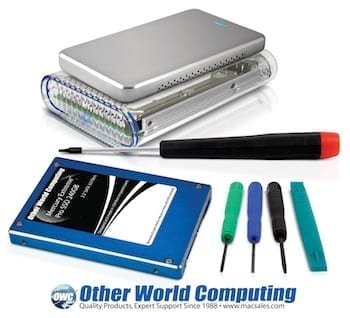



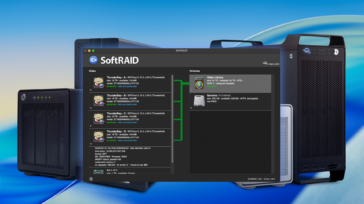


Any news on the “uncapped” firmware update mentioned in AnandTech’s review? http://www.anandtech.com/show/4315/owc-mercury-extreme-pro-6g-ssd-review-120gb
Actually all production units shipped since May do not have “capped” version of the firmware.
Sweet! Thanks ;)
Any news on when you’ll start offering them as a kit with the DataDoubler? Right now the only option is to purchase the 2 items separately, and that ends up being about $40 more than the usual kit prices.
Hey Jorge thanks for stopping by and asking this popular question. We’ll offer it eventually…just no eta right now.
Thanks for the reply Grant.
Any reason you’re not offering it from the get go? Or any other way I can get the deal? I’m ordering a few of these SSDs + DDs and it adds up quickly :^(
I want to buy the 480gb SSD 6gb/s. Any reason for the cost being almost 4 times the 240gb/s drive for twice the capacity? Or it’s just supply and demand and the price will align soon?
Like matt, I’d love to know of a PCIe controller for the Mac Pro that can support these speeds. I’ll be getting two to run in parallel (NOT raid – its a long story, but for my application, 2 volumes with me manually putting the data across the two drives is better – sample based instruments from east west / vienna symphonic library and others…)
As soon as that is sorted, I’ll be jumping on the bandwagon!!! Is there anything on the horizon? And other hacked solutions even?
At this point in time, my recommendation would be to go with the NewerTech MAXPower eSATA 6G PCIe 2.0 Controller Card with two Mercury EXTREME Pro 6G SSDs installed into two OWC Mercury Elite-AL Pro mini 2.5″ Drive Enclosures for the some of the fastest, yet cost-effective individual external non-RAID drive speeds (up to 500 MB/s) at this time.
Of course, it is a general rule in the industry that something better and faster will always be on the horizon somewhere. The question you need to ask yourself is whether the products you currently have fit the needs of your workflow. Then balance the speed improvement of the upgrade to your workflow, the cost of that improvement, and whether the wait for something better outweighs what is available within your budget now.
If you would like more assistance in finding the right products, our sales staff is available at 1-800-275-4576 to really listen to what your particular workflow entails, evaluate the equipment you have currently, and help you find that right balance.
For OWC Michael — thanks for sharing your current recommendation:
>>
to go with the NewerTech MAXPower eSATA 6G PCIe 2.0 Controller Card with two Mercury EXTREME Pro 6G SSDs installed into two OWC Mercury Elite-AL Pro mini 2.5″ Drive Enclosures for the some of the fastest, yet cost-effective individual external non-RAID drive speeds (up to 500 MB/s) at this time.
>>
I have an OWC Mercury Elit-AL Pro mini 2.5″ drive enclosure. The specs for that claims its limited to SATA 2 speeds (i.e. theoretical max of 300MB/s). A bit confused here: wouldn’t such a configuration as described do just as well using 3G SSD’s rather than the 6G? For an external enclosure not to be the bottleneck wouldn’t it need to be capable of supporting up to the same maximum rate as any of the other components? i.e. the lower of 6Gb/s to match the 6G SSD, or 500MB/s to match the controller mentioned. I can see using 2 such enclosures could then fully utilize the maximum transfer rate of the PCIe controller card, but in that case may as well use the 3G SSD’s. Doesn’t sound like there is a current solution for the current Mac Pro to take advantage of the 6G SSD’s :(
Am I missing something. Confused.
Hello Matt,
I think you got me on the chipset limitation on the enclosure, but the point I was making is still valid. While future products may be able to accommodate the SATA 6.0Gb/s performance with the Mercury EXTREME Pro 6G SSDs – at least at this time – you are limited to the bus speed of your computer or hard drive controller cards that are available currently.
The Mercury EXTREME Pro 6G SSD was developed to take advantage of the SATA 3.0 revision bus speed (6Gb/s) of the drive bay in 2011 MacBook Pro models. With the Mac Pro models released so far, the Mercury EXTREME Pro or Mercury EXTREME Pro RE drives are a better fit. Future releases of the Mac Pro will most likely take advantage of a faster bus speed (and may even have a thunderbolt port or two available), but until either a new Mac Pro is released with that technology, or a controller card is released to accommodate those speeds (with a corresponding chipset in an external enclosure if looking to use them externally) then the non-6G models of SSD are going to give the best performance under most circumstances.
Let me ask a very broad question: how is battery life (on average) using a 6G vs. the SATA II SSDs? I guess I am generically asking how much (if any) battery life loss is there from using the more powerful 6D drive? And how much (again on average) battery life can one expect to be gained or lost using these over a standard HDD? If it matters, I am inquiring in connection with a 2011 15″ MBP. Thanks.
The new Pro 6G does use more power than the ‘original’ extreme pro 3G…but the 6G is still more efficient than leading hard drive brands.
We’re working on a blog post about this and hope to shoot some comparison videos soon on this topic as well so keep checking the blog for updates on this topic.
Excellent. Thanks for posting my questions and for your replies. Loving the blog. Keep up the great work!
man, i can’t WAIT for mine to ship.
I ordered it a few days back (240gb model). The only thing that really concerns me is the problem users have been having with the 17 inch machines. I read your other blog post which says that shielding the cable solves this problem, i’m wondering how many machines have been tested with this solution? Is there any other blogs which confirm this as a solution? I’ve only heard about replacing the cable before reading your blog…I hope your solution is the “right” one because a cable is 40 dollars from ifixit and i didn’t order one…i’d hate to get the ssd and have it not work due to some flaw in the cable.
Hey Grant-
I was just wondering- based on all these comments about burst speed / 4k read/writes, etc:
Isn’t this a limitation to the very arcticture in which computers currently function: ie: Type a keystroke –> CPU recognizes this and in turn tells the Memory what to do –> the Memory then fufills the task at the SSD / HDD level. (something like that)
And taking out the middle man would be the only way to solve this. Or, making the middle man the last in line, whereas the memory and drive space are one (something like that).
All of the above could be 100 percent false. :-) ha
I guess I always wondered about that and it seemed like a limitation that may be addressed in the future of computers.
Thanks,
O-Dub Scott
Hey O-Dub…it really comes down to the SATA controller…the processor tells the controller…”hey….here’s some info…make sure the drive acts accordingly”….then the SATA controller interprets that and says to the drive “OK speedy…time to write some files.”
A better example would be a very good translator that can go between two languages easily, quickly, and completely. So that IS the middle man….
Would there be a significant jump over SATA 2.0 in normal use? I have MBP 2011, 17″ and I should be able to enjoy this new fast 6G SSD. My concern is this, for sustained data transfer, I can see the speed bump is great, but loading apps i.e. short burst, would that be a good use?
Considering to get this for sometime but trying to justify the ‘early adopter’ price premium.
You’re in luck Leonard….pretty much the same test done at MacPerformanceGuide answers that question:
http://macperformanceguide.com/blog/2011/20110418_1_OWC6GReadFiles–gear.html
You should also see our shootout videos of the previous 3G model doing that same boot and app load test:
http://eshop.macsales.com/Video/SSD/Performance_Test
MANY real world, everyday uses are dramatically improved by the addition of an SSD. Once you experience it, you’ll never go back to an HD.
Hi Jason,
Funny you say that. I told my family and friends the same thing – When you try SSD (esp. those from OWC), you’ll never go back to HDD. I own 2x 120GB OWC SSD and 1x 60GB OWC SSD. The point I’m at now is trying to justify to myself if the premium of 120GB 6G over 3G is worth it.
The benchmark assumes continuous data write/read, however, in real life such as when we write emails, documents, browsing, etc, The disk activity is really low. The only time and most noticeable speed improvement is when boot-ing up, shutting down and of course loading apps. Anything in between are idle / low activity state where it doesn’t make a difference which generation of SSD is used.
I read also MPG blogs, now I’m confused if the cable in MBP 17″ is bad or it was just a his unit… Don’t want to purchase this and found out I need the shielding cable which is not yet ready. Any further testing if it can be determined it was an isolated problem or widespread one?
Why is the read speed for random 4K on the 6G slower than the previous generation of SSD? The old one reads at 26.4MBS (47x faster than traditional drive) but the new one reads at 21MBS (36x faster).
Is there going to be a discount on the doubler bracket when purchased with the new 6G SSD? The previous generation shows a discount when bought together.
Hi Jason….we’ll certainly look into bundle deals of the Data Doubler and the Pro 6G SSD. Just remember that you want to move the 6G into the main bay on the 2011 MBPs which offers 6Gb/s data throughput. The optical bay is only 3Gb/s…
On the 4K randoms….see my answer to Matt here
What’s most important to me is iops and random 4k read and write. Is that a typo in the random 4k read speeds with the 6G? It’s no better than with a 3G interface while the random 4k writes are improved. So apps, like mine, will still be constrained to the slower 3G speed even if I use a 6G interface with this new SSD?
My concern is with all this new speed, despite faster random 4k writes my app will not show any performance boost if the numbers I just read are accurate.
Can you verify the 6G random 4k speeds… can you explain why this wouldn’t result in a speed up to about 35MB/s?
Hey Matt…thanks for stopping by again…you’re becoming a regular!
Yes…verifying our published random 4K speeds…based on the machine we used to obtain such…a 2011 MacBook Pro 15” 2.3GHz i7. The key to remember is results will vary depending on particular machine and controller in that machine. We also tend to err on the side of conservative when rating our products…we want to make sure our customers experience the performance they expect.
You’ll be happy to read though the review of our drive at The SSD Review…where they got 32.38 Read and 70.13 Write results in the following test bench machine: Intel Core i7-2600K Sandy Bridge 3.4GHz (3.8GHz Turbo Boost) 4 x 256KB L2 Cache 8MB L3 Cache LGA 1155 95W Quad-Core Desktop Processor
To see the full review, visit:
http://thessdreview.com/our-reviews/the-owc-mercury-extreme-pro-6g-120gb-sata-3-ssd-review-initial-testing/
We do have a few other machines we’ll be testing the drive with and if we find consistent higher 4K numbers, we’ll certainly update our specs.
hey Matt…as promised…we ran more tests and found higher 4K speeds…which we’ll note on our product pages:
6Gb/s – 4K Random
Read: now 36MB/s
Write: now 85MB/s
6Gb/s – Sustained
Read: stayed the same…559MB/s
Write: now 527MB/s
As I mentioned, results will vary depending on machined used in tests. For this latest round, we used an Intel Core i7 2600 3.4GHz processor on an Asus P8P67WS Revolution Motherboard with built in Intel 6G & 3G controller interfaces
Thanks OWC Grant. Like another posting I had thought I was getting more out of my current SATA 2 OWC SSD but didn’t have the exact numbers on hand. All I need now is for OWC to recommend a PCIe controller for the Mac Pro that can support these speeds. When I really need the performance the most I use a RAM disk: up to 4GB/s sustained transfer rates with that but then that isn’t persistent storage & I’d prefer to use an SSD.